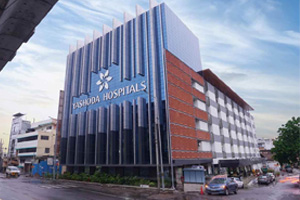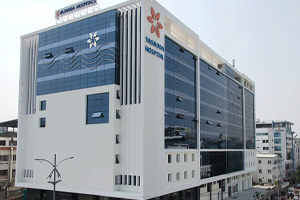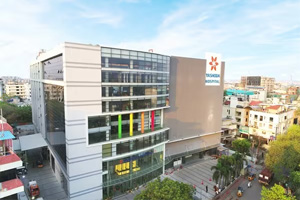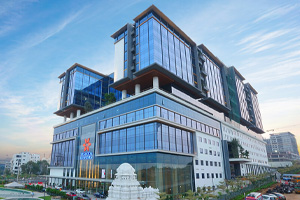Why Choose Yashoda Hospitals for Cystocele Repair?
Yashoda Hospitals offers advanced Cystocele Repair treatment for patients with personalized care and cutting-edge techniques.
01.
Best Gynecology Hospital for Cystocele Surgery
Yashoda Hospitals is recognized as the Best Hospital for Cystocele Repair in Hyderabad, offering exceptional surgical care services.
02.
Expert Gynecologists & Obstetricians
Our highly experienced Obstetrics and gynecology team specializes in performing advanced cystocele repair surgery procedures, ensuring optimal outcomes for all patients.
03.
Cutting-edge Facilities
Equipped with state-of-the-art technology and advanced medical equipment, our facility provides the perfect setting for precise and accurate cystocele treatment.
04.
Dedicated Surgical Care
Our dedicated surgical care team is committed to guiding you through every step of your cystocele repair surgery
What is Cystocele Surgery?
Cystocele, or anterior vaginal prolapse, occurs when the bladder drops from its normal position, leading to vaginal tissue bulging, difficulty in urinating, and painful intercourse. It results from weakened pelvic floor muscles due to factors like vaginal childbirth or chronic conditions. Mild to moderate cases can be managed with nonsurgical methods, while severe cases may require surgery to maintain pelvic organ positioning. Cystoceles are graded as mild, moderate, or severe, with mild cases causing discomfort or urine leakage, and severe cases potentially leading to urinary issues and kidney damage.
A cystocele affects women of all ages, with increased risk due to weaker muscles and tissues, vaginal birth, pelvic surgery history, obesity, and family history of pelvic organ prolapse. Surgical approaches to treat vaginal prolapse include anterior and posterior repair, vaginal suspension surgery, and abdominal cystocele repair surgery. Anterior repair corrects cystoceles, posterior repair corrects rectoceles, and combinations of these methods are used when prolapse exists in multiple areas. Abdominal cystocele repair surgery suspends the vaginal vault and uterus.
| Procedure Name | Cystocele Repair |
|---|---|
| Type of Surgery | Open or Minimally invasive (laparoscopic or hysteroscopic) |
| Type of Anesthesia | General Anesthesia |
| General or spinal anesthesia | 30 minutes - 2 hours |
| Recovery Duration | Few weeks to few months |
Cystocele Repair: Pre-Op & Post-Op Care
Preparation for Cystocele Repair
Before surgery, gynecologists discuss risks, benefits, and treatment options for repairing cystoceles. They may conduct blood or urine tests, review medical history, symptoms, and perform a physical examination. Urodynamic testing to assess bladder function and cystoscopy to detect urinary tract issues may be done pre-surgery.
During the Cystocele Surgery:
Post-anesthesia, a midline vertical vaginal incision frees the prolapsed bladder, with sutures placed for support. A cystoscopy checks for bladder or urethra damage. A pubovaginal fascial sling may treat urinary incontinence or reduce recurrence. Excess vaginal skin may be removed before closing the wound.
After the Surgery:
Most patients stay in the hospital for 1 to 2 days, with the vaginal pack removed on day 1 and the catheter removed on either day 1 or 2, depending on pain and mobility, and if the patient is satisfied, they can return home.
Cystocele repair recovery
After surgery for severe cystocele, recovery may take a few weeks, but most people experience a complete recovery within a few months. However, the cystocele repair recovery time might vary from person to person based on the severity of the condition, the type of surgery undergone, and the patient’s overall health condition.
Post-procedure care:
Post-Operative Care Guidelines include:
- Avoid heavy lifting or strenuous activities for 6 weeks.
- Perform light home duties like walking, short walks, and shopping as suggested.
- Take pain medication as directed.
- Avoid driving for 3 to 5 days to prevent post-op pain.
- Avoid sexual intercourse for 6 weeks to allow vaginal wound healing.
- Consult with a doctor about work return, typically within 3 to 4 weeks for non-demanding work.
- Attend post-op appointments to prevent further complications.
Benefits of Cystocele Repair at Yashoda Hospitals
- Enhanced Urinary Control & Sexual Function
- Quality Of Life
- Minimal Hospitalizations
- Minimally Invasive
- No Blood Loss
- Quick Recovery






























 Appointment
Appointment WhatsApp
WhatsApp Call
Call More
More

